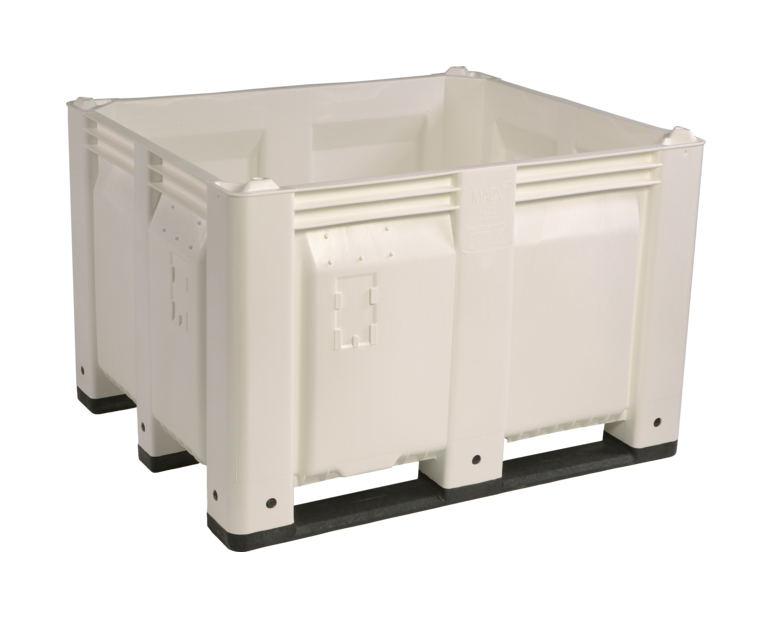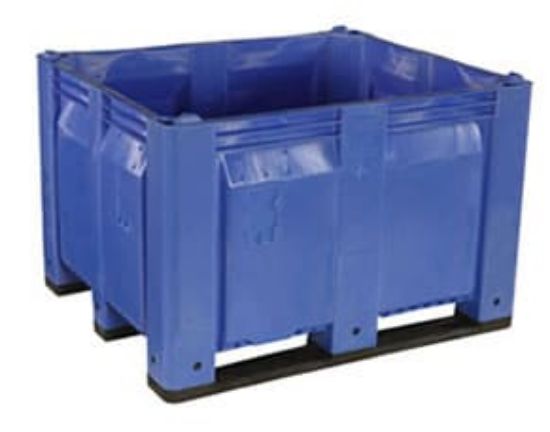Why Mass Containers Are Crucial for Cost-efficient and sustainable Transport
Mass containers play a necessary duty in modern-day logistics. They promote the reliable activity of huge quantities of items, therefore enhancing transportation processes. This technique not only minimizes prices but likewise decreases ecological influence via lower emissions and waste generation. As sectors seek even more lasting practices, the adoption of bulk containers is coming to be progressively considerable. What implications does this change hold for future logistics and supply chain administration?

The Advantages of Making Use Of Mass Containers in Logistics
Mass containers revolutionize logistics by boosting effectiveness and sustainability. These containers permit for the transport of huge amounts of goods in a solitary journey, markedly reducing the number of journeys called for. This not just simplifies procedures however likewise lessens labor expenses connected with handling, loading, and unloading. In addition, mass containers are made to maximize space application within transport vehicles, guaranteeing that even more items can be shipped simultaneously.
The standardization of bulk containers also simplifies the logistics process. With uniform dimensions, they can be quickly piled and stored, causing boosted storehouse administration. Moreover, bulk containers commonly feature resilient products that secure contents from damages throughout transportation, thus reducing product loss and increasing overall dependability. Consequently, businesses can experience boosted supply chain performance, inevitably resulting in increased earnings and consumer complete satisfaction. This combination of variables makes bulk containers a vital asset in modern-day logistics.
Ecological Influence: Decreasing Waste and Carbon Footprint
As industries progressively prioritize sustainability, the fostering of bulk containers has actually become a crucial strategy for minimizing waste and decreasing carbon footprints. These containers lessen making use of packaging products, such as boxes and plastic, thus notably reducing total waste generation. By settling shipments, bulk containers improve transport performance, enabling for more products to be transported per journey. This reduction in trips straight associates with reduced greenhouse gas discharges, adding to a smaller sized carbon footprint.
Additionally, mass containers can frequently be reused or reused, better mitigating environmental effect. The durability of these containers warranties they can withstand several transport cycles, decreasing the requirement for single-use options. used collapsible bulk containers. By simplifying logistics and promoting effective resource usage, bulk containers not just sustain lasting techniques however additionally motivate sectors to straighten with global environmental goals. Ultimately, their execution reflects a commitment to environmental stewardship and accountable resource management
Cost Cost Savings: How Mass Containers Lower Transport Costs
While several companies look for means to boost their lower line, using bulk containers offers a significant chance for reducing transport costs. Bulk containers take full advantage of the volume of goods transferred, allowing organizations to ship bigger quantities simultaneously. This performance minimizes the number of journeys needed, straight reducing fuel costs and reducing labor expenditures related to loading and unloading.
Additionally, mass containers typically include streamlined designs that maximize area utilization within transportation cars. This suggests fewer vacant areas, leading to extra efficient use offered ability. Furthermore, the resilience of mass containers can lower the danger of item damage during transportation, reducing losses and making certain that more products arrive undamaged.
Enhancing Supply Chain Efficiency With Mass Storage Solutions
Mass storage remedies play a crucial role in improving supply chain efficiency by enhancing supply monitoring. By consolidating goods into fewer, bigger containers, companies can greatly reduce dealing with expenses related to constant transfers and processing. This streamlined method permits much better tracking and administration of stock, eventually bring about boosted functional efficiency.
Streamlined Stock Administration
Efficient stock administration is crucial for optimizing supply chain operations, especially when companies adopt bulk storage space options. These remedies enable services to keep higher supply degrees while minimizing the regularity of replenishment. By settling materials into bulk containers, companies can improve their inventory processes, reducing the complexity connected with tracking several smaller plans. This method helps with accurate supply matters and improves forecasting accuracy, enabling even more educated decision-making. Additionally, mass storage space services streamline stockroom company, making it less complicated to find and access items when needed. Consequently, companies can achieve a much more reliable inventory turn over price, inevitably boosting overall supply chain efficiency and decreasing the likelihood of stockouts or overstock circumstances.

Reduced Handling Prices
The application of bulk storage space remedies not only enhances supply administration but likewise substantially decreases managing expenses across the supply chain. By combining materials into mass containers, business decrease the demand for constant handling and transfer in between various storage space and transportation devices. This strategy reduces labor expenses linked with loading, dumping, and relocating smaller plans. Additionally, mass storage space minimizes the regularity of deliveries, leading to lower transport expenses and reduced gas usage. As an outcome, businesses can optimize their logistics operations, enabling for a more efficient allotment of resources. Eventually, decreased managing expenses add to boosted overall supply chain efficiency, fostering an atmosphere that supports both sustainability and economic stability.

Versatility of Bulk Containers Throughout Various Industries
Several industries have unique needs for transport and storage space, mass containers have actually arised as a versatile solution that meets a vast variety of requirements. These containers, varying from huge containers to specialized tanks, can accommodate diverse materials, consisting of liquids, powders, and granules. In the agricultural sector, bulk containers facilitate the transport of grains and fertilizers, while the food and beverage market utilizes them for components and completed items. The chemical market depends on mass containers for safely moving harmful products, making sure conformity with security policies. Furthermore, building firms benefit from mass containers for moving accumulations and other materials. Their adaptability prolongs to various settings of transport, including trucks, ships, and trains, boosting logistical efficiency. This convenience not just improves procedures throughout different fields however additionally promotes sustainability by lowering product packaging waste and enhancing area en route. Bulk containers play a necessary role in modern-day supply chain administration.
Future Fads in Bulk Container Use and Sustainability
The future of bulk container use is increasingly formed by innovative products advancement that enhances sustainability. Furthermore, automation in logistics promises to enhance procedures, minimizing waste and improving effectiveness. Embracing round economic situation techniques will certainly better transform exactly how bulk containers are developed, utilized, and recycled, promoting a more sustainable transport landscape.
Innovative Products Development
As markets increasingly prioritize sustainability, ingenious products development wholesale containers arises as a significant variable in enhancing environment-friendly transport options. Makers and researchers are exploring naturally degradable plastics, recycled compounds, and light-weight steels to lower ecological influence. These materials not only minimize waste however additionally boost gas efficiency by decreasing the overall weight of containers. Additionally, improvements in clever products, which can adjust to differing conditions, improve the toughness and capability of mass containers. The assimilation of these innovative materials aligns with round economy principles, advertising reuse and recycling. As the need for lasting techniques grows, the growth of such materials will play a crucial duty in forming the future of bulk container use in logistics and transportation.
Automation in Logistics
Significant innovations in automation are positioned to transform logistics and the usage of bulk containers, enhancing sustainability in transport. Automated systems, consisting of drones and self-governing automobiles, are streamlining the activity of mass containers, lowering the dependence on typical fuel-powered transportation. These innovations optimize transmitting and filling processes, minimizing vacant miles and enhancing fuel performance. Furthermore, automated inventory monitoring systems improve tracking and surveillance of mass containers, making sure better source allocation more info and lowered waste. The combination of the Web of Things (IoT) permits real-time information analysis, allowing proactive decision-making that lines up with sustainability goals. As automation remains to evolve, it is expected to drive even more developments wholesale container usage, ultimately supporting even more sustainable logistics methods and decreasing the environmental influence of transport.
Circular Economic Situation Practices
Improvements in automation are setting the phase for an extra integrated approach to circular economic situation methods in the domain name of mass container use. As sectors progressively embrace sustainability, bulk containers are being designed for durability and reusability. This change not only minimizes waste but additionally boosts resource performance. Companies are embracing approaches such as closed-loop systems, where used containers are collected, refurbished, and reestablished right into the supply chain. In addition, smart innovations track container life process, assisting in far better management and decreasing environmental effect. The cooperation in between manufacturers, logistics providers, and end-users is vital in developing criteria for sustainable container usage. used collapsible containers. Future patterns indicate an expanding focus on materials that are recyclable and eco-friendly, further reinforcing the circular economic climate's concepts in mass transport
.jpg.png)
Often Asked Concerns
What Materials Are Bulk Containers Commonly Made From?
Bulk containers are usually created from durable materials such as high-density polyethylene, cardboard, steel, and aluminum. These materials offer security, adaptability, and toughness, making them ideal for transferring different items in different markets successfully.
Exactly how Do I Choose the Right Size Mass Container?
Picking the ideal size mass container entails reviewing the quantity of materials to be delivered, considering dealing with devices compatibility, and evaluating storage space demands. Appropriate size guarantees performance in transport and lessens waste during shipment.
Are Mass Containers Reusable or Recyclable?
Mass containers are typically recyclable, designed for several trips, boosting sustainability. Many can likewise be recycled, depending on the products made use of. Picking recyclable choices even more reduces and sustains environmental goals waste in transportation practices.
What Safety Regulations Relate To Bulk Container Transportation?
Security guidelines for bulk container transport include conformity with the Division of Transport guidelines, appropriate labeling of unsafe materials, structural integrity assessments, and adherence to weight limitations to assure risk-free handling and prevent mishaps throughout transportation.
Just How Can Organizations Shift to Utilizing Mass Containers Successfully?
Organizations can change to bulk containers by assessing present logistics, training personnel on handling, buying suitable equipment, enhancing stock administration, and collaborating with distributors to ensure compatibility and effectiveness throughout the supply chain.
As industries significantly focus on sustainability, the fostering of mass containers has emerged as a crucial method for reducing waste and lowering carbon impacts. By combining products into bulk containers, firms can enhance their supply processes, minimizing the intricacy linked with tracking several smaller sized packages. As markets increasingly prioritize sustainability, ingenious products growth in bulk containers emerges as a substantial variable in enhancing green transport services. Automated systems, including drones and independent cars, are improving the activity of mass containers, reducing the dependence on traditional fuel-powered transportation. In addition, automated inventory administration systems enhance tracking and tracking of bulk containers, ensuring much better resource appropriation and minimized waste.